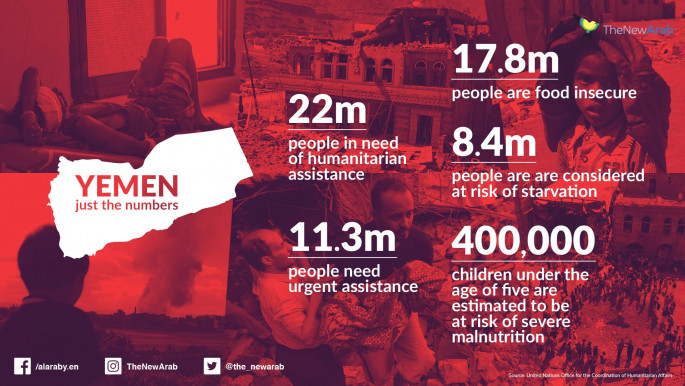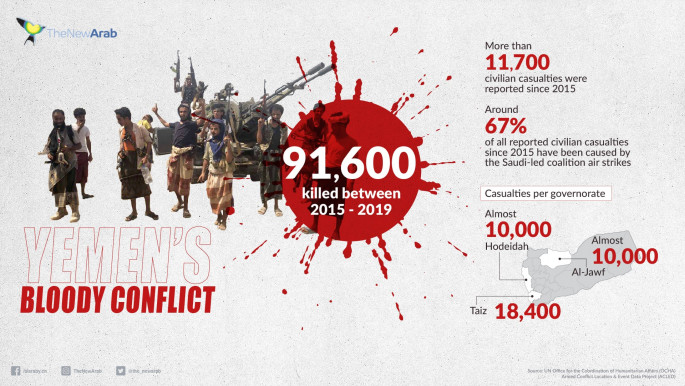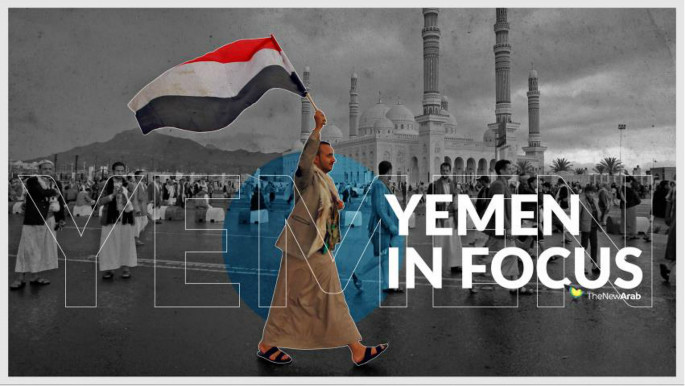Yemen in Focus: Will Israel join the deadly conflict?
On Friday, Kuwaiti newspaper al-Jarida released a report saying Israel is planning on striking sensitive positions on the Bab al-Mandab strait linking the Red Sea and the Gulf of Aden, targeting Houthi rebels in the area.
The newspaper, which cited an anonymous informed source, said Israeli intelligence agency Mossad has been monitoring activities in in the Yemeni strait, finding Iranian attempts to transport weapons to the Houthi rebels.
The source added Tel Aviv shared information with Arab states, not elaborating on which ones.
Read also: Saudi-Israeli relations: The emergence of a new alliance
Israel reportedly briefed the United States on the developments and provided information on Iran transporting weapons using the strait, according to al-Jarida.
The latest development comes as US officials confirmed earlier suspicions that Israel had been launching strikes on Shia paramilitary forces in Iraq, prompting fears that Tel Aviv's ambitions may spill over to Yemen.
Although no official confirmation has surfaced, a Yemeni journalist and researcher told The New Arab the news is likely.
"The Israeli airstrikes are likely to happen in Yemen if Israel wants. Yemeni airspace has been open to the Saudi-led Arab coalition and the American drones since the war breakout in 2015," he said.
"It is difficult for the Yemeni government and military to prevent any aerial attacks by Saudi Arabia, UAE or United States and now Israel can join. All these countries have a common enemy: Iran and its proxies," the journalist, who spoke on condition of anonymity said.
"But any attack by Israel in Yemen will help the Houthis gain further tremendous popular support," he added.
UN warnings
On the ground, Yemen has its own serious and more current problems, so much so that the UN's special envoy to Yemen warned on Tuesday that the war-ravaged country faced the prospect of breaking apart unless an agreement ending the decades-long conflict is found urgently.
Martin Griffiths told the UN Security Council that there is "no time to lose" in brokering a peace deal to bring an end to fighting that has ravaged south Yemen in recent weeks.
"The fragmentation of Yemen is becoming a stronger and more pressing threat," the British diplomat said via video link from Jordan.
"The stakes are becoming too high for the future of Yemen, the Yemeni people and the wider region. Yemen cannot wait," he added.
Griffiths comments came as UAE-backed Yemeni separatists drove government troops out of two military camps in deadly clashes in Abyan province on Tuesday, reinforcing their presence in the south after they seized the de facto capital Aden.
He condemned the recent takeover of Aden by the Southern Transitional Council (STC) in clashes that reflected the independence ambitions of southern Yemen and left around 40 people dead.
"We certainly cannot underestimate the risks that these events pose for the future of the country," Griffiths told delegates.
"No country can tolerate the stresses of internal conflict indefinitely," he added saying the war must be brought to an end "swiftly and peacefully."
The separatist Southern Transitional Council (STC) and government forces have been fighting the Houthi rebels in years-long war that has pushed the country to the brink of famine.
A spike in tensions between the two has constrained their cooperation in the fight against the Houthis, however.
Griffiths warned that further deterioration of the security situation in Aden and other areas could provide fertile ground for a resurgence of al-Qaeda in the Arabian Peninsula and the so-called Islamic State group.
"(It) almost certainly will allow those activities to expand and gather momentum once again as we have seen before, with a terrible impact on the civilian population and prospects for future stability in this key strategic location," he said.
Yemen-UAE fallout?
Griffiths warnings came as no surprise after even the internationally-recognised government of Yemen itself expressed frustration at its UAE ally on multiple occasions this week.
Yemen's Saudi-backed government accused its UAE ally of supporting what it described "a coup" in the temporary capital Aden, warning on Wednesday it would take legal action against the Gulf state as separatists advanced in on a nearby southern city.
Deputy Foreign Minister Mohammed al-Hadhrami warned the government would take action "in accordance with international law and the UN Charter to ensure that the UAE halts its supports for the the transitional council, which has enabled the armed rebellion in Aden and Abyan", according to The New Arab's Arabic sister platform.
The Yemeni official added the government "will not take part in discussions with the (STC)... unless it withdraws from positions it has seized" and hands over all the weapons it captured from government troops.
The Yemeni government, which has denounced a UAE-backed "coup", said on Tuesday that Abu Dhabi was "fully responsible for the armed rebellion" and urged it to stop backing "this militia".
"The armed rebellion... is supported financially, logistically and with the knowledge of the UAE," Yemen's permanent representative at the UN, Abdullah al-Saadi, said in comments carried by state media.
"If it were not for the full support of the UAE, this rebellion would not have taken place," he told the UN Security Council.
The UAE, which has been financing and training fighters in the south of Yemen for several years, rejected accusations it supported southern separatists in their seizure of Aden.
But on Friday, the Yemeni government doubled-down on accusations against the UAE, accusing it of sparking the clashes in Shabwa province, which is rich in oil.
A government spokesman, Rajeh Badi, said that Emirati forces based in the Belhaf area had instigated the attack by the separatist 'Shabwa Elite' militia on Ataq despite Saudi efforts to calm the situation in the province.
Forces loyal to Yemen's internationally-recognised government regained full control of the key southern city after overnight clashes with separatists, Yemeni security officials said on Friday.
Deadly clashes over Ataq, the capital of Shabwa province in south-eastern Yemen, erupted late on Thursday night and lasted until Friday morning, said the security officials, speaking on condition of anonymity because they were not authorised to talk to the media.
The city of Ataq was previously divided between Saudi-backed President Abedrabbo Mansour Hadi's government forces and a separatist militia, trained and armed by the United Arab Emirates.
'Life-saving' aid programmes
As fighting raged on in the south, the UN warned on Wednesday that more then 20 "life-saving" aid programmes will be forced to close in Yemen in the next two months if countries do not pay more than $1 billion in funding pledged earlier this year.
 |
More then 20 'life-saving' aid programmes will be forced to close in Yemen in the next two months if countries do not pay more than $1 billion in funding pledged earlier this year |  |
Only three of 34 key aid programmes received funding for the year, leaving 22 at risk of shutting down in the country described by the UN as the world's worst humanitarian crisis.
The warning came after countries pledged $2.6 billion to help Yemen in February, but UN humanitarian coordinator for Yemen, Lise Grande, said less than half that had been paid.
"We are desperate for the funds that were promised. When money doesn't come, people die," Grande said in a statement. "It's heart-breaking to look a family in the eye and say we have no money to help."
In July, a senior UN official appealed for the international community "not to turn its back" on Yemen and to honour its pledges of aid for the impoverished and war-battered country.
"Four years of conflict according to the UNDP latest report have set back Yemen by 20 years," United Nations Development Programme administrator Achim Steiner told AFP in an interview in Amman.
He said the United Nations had received less than 36 percent of the $2.6 billion (2.3 billion euros) pledged at a Geneva conference in February.
"Currently in the next two or three months we can expect that if funding does not materialise, over 21 programmes will have to be rolled back," Steiner added following his first visit to Yemen since taking up his post in 2017.
Tens of thousands of people have died since the Saudi-led coalition intervened in support of the Yemeni government in 2015, according to relief agencies.
"It is the worst humanitarian crisis in the world and in some respects it is getting worse because hostilities and fighting still continue and the situation for 20 million or over two thirds of Yemeni citizens require humanitarian support," he said.
"Ten million people currently face the acute risk of famine. The world should not turn its back on Yemen," he urged, appealing for "solidarity and generosity" from the international community.
An estimated 24 million Yemenis - more than 80 percent of the population - depend on some form of humanitarian or protection assistance for survival, according to the UN.
The world body has warned that millions of Yemenis are on the verge of famine, while essential health, education and other services have all but collapsed.
 |
When money doesn't come, people die... It's heart-breaking to look a family in the eye and say we have no money to help |  |
Houthi ambitions
Despite the deteriorating situation in the country, Yemen's Houthi rebels and self-imposed government, who have been running that capital since 2014, appointed an "ambassador" in Tehran, in a step condemned by the internationally recognised government as a breach of international laws.
The Islamic republic made no announcement about accepting the appointment of an ambassador for the Houthis, who control Sanaa and much of the north.
The Houthi-run Al-Masirah TV said late on Saturday that a "presidential decree was issued appointing Ibrahim Mohammed Mohammed al-Dailami as an ambassador extraordinary and plenipotentiary for the republic of Yemen to the Islamic republic of Iran".
Hadi had severed diplomatic relations with Iran in October 2015, accusing Tehran of providing military aid to the rebels.
Tehran has denied the accusation but publicly offers strong political backing to the Houthis.
The Yemeni government denounced the naming of an ambassador.
"The exchange of diplomatic relations between Tehran regime and the Houthi militias breaches the international laws and norms and contravenes United Nations Security Council resolutions related to the Yemen crisis," the government said in a statement on Twitter.
It said the step has exposed the hidden relationship between the Houthis and Iran.
The announcement comes after Iran's supreme leader Ayatollah Ali Khamenei held talks in Tehran on Tuesday with a Houthi delegation headed by rebel spokesman Mohammed Abdul Salam.
Khamenei renewed his support for the Houthis and accused Iran's foes of a "plot" to partition the country.
Sana Uqba is a journalist at The New Arab.
Follow her on Twitter: @Sanasiino
Yemen In Focus is a new, regular feature from The New Arab.
Click below to see the full archive.





 Follow the Middle East's top stories in English at The New Arab on Google News
Follow the Middle East's top stories in English at The New Arab on Google News


